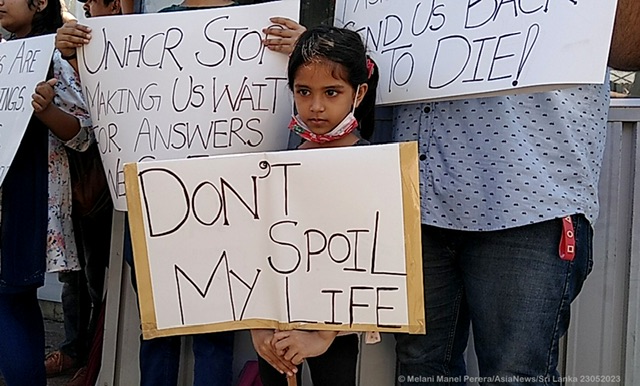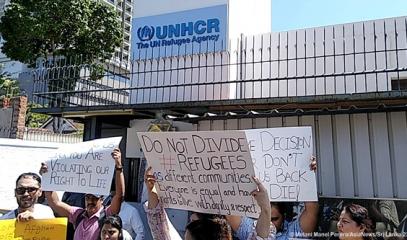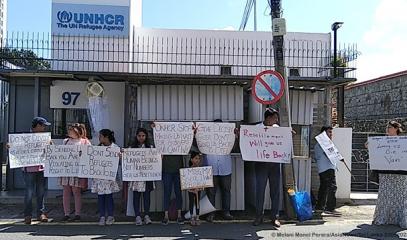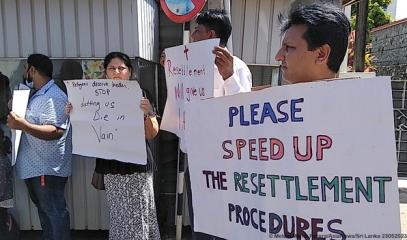Colombo, refugees in square under UNHCR headquarters to 'speed up' relocations
In Sri Lanka there are 800 refugees from Pakistan, Rohingya from Myanmar, Afghans, Syrians and Yemenis. The probable closure, or at least downsizing, of the UN body's headquarters fuels uncertainty for the future. The majority have been living for years suspended in limbo, without jobs or education for their children.
Colombo (AsiaNews) - Relaunch, but above all speed up "the process of relocation to a third nation" to avoid further suffering. This is the request of a group of refugees entrusted to the care of the UNHCR, who took to the streets on 23 May in front of the UN agency's headquarters in Colombo to make local authorities and the international community aware of their fate, which has long been suspended in limbo.
'Make a decision as quickly as possible,' read the slogan emblazoned on a placard, 'and do not send us back to certain death.
In the front row leading the protest was a group of Pakistani refugees, long since relocated to the island and waiting (so far) in vain for permanent accommodation. According to estimates by activist Ruki Fernando, to date there are about 800 refugees in Sri Lanka, mostly from Pakistan, Afghanistan, Rohingya from Myanmar, as well as groups from Yemen, Syria and Nigeria. Most live in Negombo, as well as Panadura, Dehiwela and Mount Lavinia.
The protesters wanted to remind that 'refugees are human beings, not numbers. Guarantee us accommodation', as one of the many posters read. Another stated that 'By sending us back, you are violating our right to live' and again 'Do not divide refugees into different communities. We are all equal and deserve dignity and respect'. Some did not spare direct attacks on the UN High Commissioner for Refugees, who "must stop leaving us waiting for an answer" that has never arrived over the years.
"We are not a priority for the UNHCR," a protester from Pakistan told AsiaNews, 'but how long can we wait? We have already been here in Sri Lanka for seven years waiting. We have had enough, we want justice'. "We have young children and they don't have a future either," adds the woman. They have no schools here. I don't know my future either. We ask to speed up our relocation."
A second woman, also Pakistani, says she has been in Sri Lanka for 10 years and still has no clear prospects about her future or a country to go to. "We don't work here. Our children don't go to school and have no education' she complains, adding that the biggest fear is 'a closure of the UNHCR office soon' and 'without their support, what will become of us?' she wonders in despair.
Yet another, also from Pakistan, tells of the father who died while waiting in vain to go to another country, the mother who suffers from diabetes and her 14-year-old son who also suffers from high blood pressure and survives on medicines taken morning and night. 'Please send us,' the man exclaims, 'to a third world country. We cannot work here. And it is very difficult to buy food. Food, medicine and house rent are very high. We cannot live here".
"One of the demands of these people," explains activist Ruki Fernando, "is that the decision be made as soon as possible. Some have been waiting for years for permanent accommodation. This means they do not know whether they will get asylum or not'.
Adding to fears, fears and uncertainty about the future, she concludes, is the news anticipated by UNHCR officials themselves of a possible closure of the UN office or, in any case, of a sharp reduction in support and aid.










.png)










